#about; rue
Explore tagged Tumblr posts
Text

i wanna love tomorrow, but i love what’s left
#kingdom come deliverance#kcd2#kcd2 fanart#hansry#henry of skalitz#hans capon#jitka of kunstadt#the lyrics is from babylon by tamino and you should give this song a listen because it’s amazing and it inspired this picture#the flowers are astragalus heliotrope and rue#if you wanna visit list of plants with symbolism on wiki i’ll see you there#justice for jitka girl did nothing wrong (yet) and deserves better#i have my own picture of her in my mind and i won’t let anyone say bad things about her ya hear meh#anyway thank you for being here
6K notes
·
View notes
Text
I saw a video of C.ody R.hodes agreeing to be the best man at a random fan he didn't know's wedding. And all I could think is that's some serious Rue energy there.
Like she'd absolutely agree to be Maid of Honor for some random fan she meets at a convention or something. She'd just be like "DM me the deets, send me the link for the MoH dress, I'll be there." And she would be too.
1 note
·
View note
Note
🍳 - what is your muse’s favorite breakfast?
For Crystal and Rue
Crystal loves a good ol' fashion country breakfast. Biscuits and gravy, grits, eggs, sausage or bacon. And maybe even some occasional pancakes too.
Rue somehow survives off of nothing but iced coffee and smoothies until about 6PM and then has dinner. (Sometimes she'll have a chicken wrap or something of that nature for lunch.)
0 notes
Text
hot take (maybe)
i know many of you think percy is the gossip guy, but in the books he usually doesn’t really care about what’s going on in other people’s lives that much. he cares about his friends obviously, but he doesn’t ever give off the vibes of being someone who would enjoy gossip and drama at all. i feel like he’s the “i didn’t ask” guy. like tell me this isn’t how it would go
annabeth: oh good you’re home! how were the guys?
percy: good. i tried to teach frank to skateboard. it… it didn’t go very well. that guy is strong as fuck but he has terrible balance!
annabeth: i could have told you that. is anything new with any of them?
percy: i don’t know. not really? although when we were watching the game, chris mentioned him and clarisse broke up. it was right before halftime when-
annabeth: WHAT?? WHY DID THEY BREAK UP??
percy: uhh, i don’t know
annabeth: okay well when did they break up?
percy: hm, i don’t know
annabeth: what do you mean you don’t know?? did he not want to talk about it??
percy: maybe. i don’t know. i didn’t ask
annabeth: you- you didn’t ask??
percy:
annabeth: this is why i need leo to be at these things!
#then annabeth immediately leaves the room to iris message clarisse#and percy immediately moves on#in fact he’s already forgotten about it#he just wants to go see estelle#LEO is the gossiper#leo valdez#percy jackson#annabeth chase#percabeth#clarisse la rue#chris rodriguez#frank zhang#pjo#heroes of olympus#percy jackson and the olympians
5K notes
·
View notes
Text
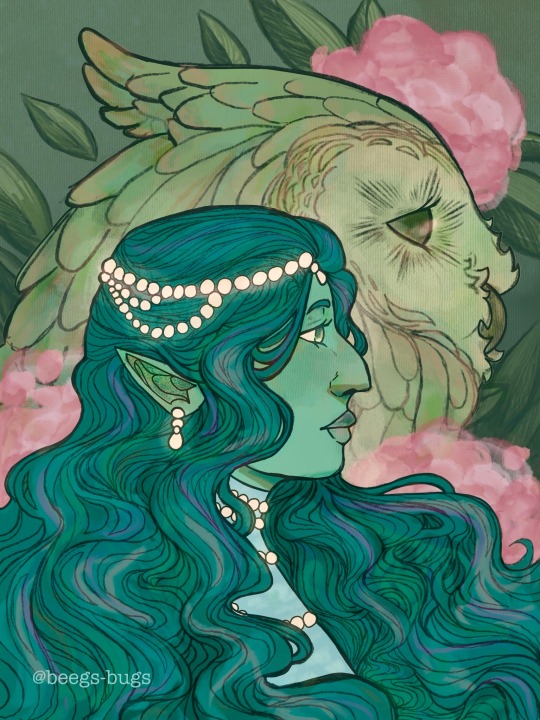
“You are all I need.”
Delloso De La Rue, Court of Wonder, Mistrex of Ceremonies
#delloso de la rue#dimension 20#a court of fae and flowers#acofaf#a court of fey and flowers#aabria iyengar#my art#oscar montoya#my art <3#owlbear#faerie#art nouveau#digital art#d20 acofaf#dropout#d20#ruehob#kp hob#Beegs art#beegs-bugs#quiddie#the parallels#normal about them#nonbinary#they are so dear to me#the complex character ever
2K notes
·
View notes
Text
Captain Marvel is at Camp Half-Blood with a new demigod child.
Annabeth: Who this time?
Marvel: Apollo. I mean, he did a great job hiding his daughter.
The girl with the golden hair is holding onto Marvel and looking at Annabeth in disbelief.
Annabeth: How could he?
Marvel: He abandoned her in a foster home in Fawcett. But he didn't tell me. I'm going to kick his ass for that.
Annabeth nods and sits down in front of the girl. She hides behind Marvel even more. Marvel gently strokes her head.
Marvel: It's going to be okay. No one will hurt you here.
The girl nods slowly and takes Annabeth's hand.
Marvel: Behave yourself. I'll fly back to visit you soon. I'll tell your parents you're safe.
The girl brightens and smiles. She leaves with Annabeth and waves goodbye to Marvel.
Clarisse approaches Marvel: *sarcastically* Welcome to the outcast camp, Champion.
Marvel: Clarisse...
Clarisse: Shut up. You will never understand the likes of us. I hate to see you, Beloved of the Gods.
Marvel just sighs and shakes his head. He takes off and flies back to Fawcett, he doesn't want to fight the Ares gene pool right now.
#billy batson#dcu#dc captain marvel#captain marvel#shazam#clarisse la rue#annabeth chase#dc×pj#dc × pj#I think Fawcett is perfect for hiding demigods#The Champion is nearby and the Rock of Eternity too#lots of magic#if you want to live then you won't go to the Champion's city because he can really erase you from the plane of existence#Apollo was the first to realize that the monsters were avoiding Fawcett like the plague#he decided to act#but he didn't tell Billy about his plan so he'll get his ass kicked
454 notes
·
View notes
Text

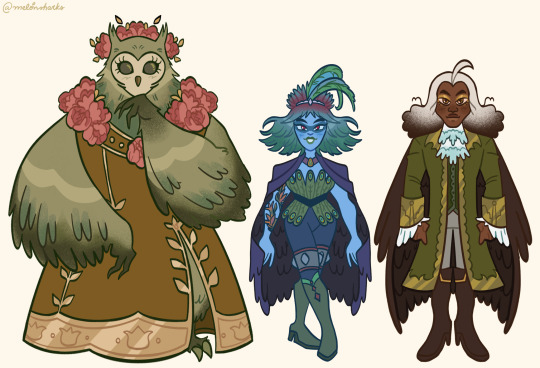
rewatched a court of fey and flowers and god i LOVE this season. squeezed out a lineup to figure out how to draw the pack of pixies!
#dimension 20#d20#acofaf#acofaf spoilers#a court of fey and flowers#prince andhera#binx choppley#captain kp hob#delloso de la rue#lady chirp featherfowl#lord squak airavis#pack of pixies#gabuart#been having the most private hyperfixation ever with this campaign#just the quietest freak out in my priv twitter where this is all i talk about for like.#the past two weeks#so thats (shaking) cool no its cool that novody is talking about this anymore
2K notes
·
View notes
Text
Rue is the hummingbird to Katniss's mockingjay pin.
"They'd been fashioned by Tam Amber over thirty years ago. I never saw them, but Merrilee's featured a hummingbird and Maysilee's a mockingjay."
- SOTR, Page 54
"Aren't they magnificent? Thirteen has been studying their aerodynamics here for years. Forward and backwards flight, and speeds up to sixty miles per hours. If only I could build you wings like these, Katniss!" "I doubt you could manage them, Beetee," I laugh. "Here one second, gone the next. Can you bring a hummingbird down with an arrow?" he asks. "I've never tried. Not much meat on them," I answer. "No, and you're not one to kill for sport," he says. "I bet they'd be hard to shoot, though." "You could snare them maybe," Gale says.
- Mockingjay, Page 65
When he asks what her greatest strength in the arena will be, she doesn't hesitate. "I'm very hard to catch," she says in a tremulous voice. "And if they can't catch me, they can't kill me. So don't count me out."
- The Hunger Games, Page 126
"Oh no," says Rue, closing my fingers back over the pin, "I like to see it on you. That's how I decided I could trust you. Besides, I have this." She pulls a necklace woven out of some kind of grass from her shirt. On it, hangs a roughly carved wooden star. Or maybe it's a flower. "It's a good luck charm."
- The Hunger Games, Page 212
#beyond these quotes#rue is always described as a bird about to take flight#and she hops from tree to tree like a bird#here one minute gone the next#and she's snared in a net when she dies#also it's completely possible katniss didn't know what a sunflower was and thought it was a star#just like the tokens in sotr#anyway this made me sad#the hunger games#thg#sunrise on the reaping#sotr#katniss everdeen#sotr spoilers#rue
214 notes
·
View notes
Text

IM SORRY HUH,,,,,,, DIOR ?????????????
#CAN WE TALK ABOUT DIOR PLAYING CLARISSE FOR A SEC#LIKE??????#TBH I CONSIDERED CLARISSE A PRETTY ANNOYING AND PLAIN CHARACTER IN THE BOOKS BUT#MA'AM???#GIRL GOT ME FALLING IN LOVE W A BULLY LIKE 😭😭😭#clarisse la rue#dior goodjohn#pjo#percy jackson#hoo#pjo/hoo#rick riordan#riordanverse#annabeth chase#grover underwood
2K notes
·
View notes
Text
Not sure if this has already been said but I was going through the illustrations for the Illustrated hunger games and I can’t stop thinking of the depiction the artist took for Thresh.
In the original book, Katniss describes Thresh as powerful and intimidating—a build on par with the Careers, strong and silent, a mysterious threat lurking on the edges of the arena that is able to hold out until the very last days of the 74th games. And you can see how this interpretation informed the casting choices made for him in the live action adaptations. For years, the only image we’ve had of Thresh is of this strong, unstoppable guy who had to be taken out by either the physically strongest guy in the Games, or by monsters designed by the Capitol itself.
And then, you see Thresh as he’s illustrated.

The low angle. The backlight throwing almost his entire figure into shadow. The way he holds aloft the rock he just killed Clove with—the fact that you can *see* Clove’s corpse in the background. Everything about this image is designed to paint Thresh as this hulking berserker, moments away from beating in your skull.
But then you see his face. Those eyes, welling with tears. The look of disbelief. The way his mouth is opened—what is he saying? Is he asking Katniss if she’s the one who killed Rue? The little girl who would sing when it was time to go home from the fields? Or is he stunned into silence as Katniss recounts how she buried Rue in flowers, how she sang to her in her final moments? In the books it’s mentioned that he never talked to anyone—was he preparing, like Katniss, to see everyone in that arena as a threat? How shocked must he have been that this random girl he never even spoke to, whose name he’s probably forgotten, go to such lengths to show kindness to someone who wasn’t from her district?
More than anything, he looks so *young.* His eyes are large and expressive—his face is soft, still retaining a little baby fat. Throughout the book, Katniss categorizes her fellow tributes as potential threats first and foremost—she often describes Thresh as a stoic, unflinching powerhouse, but then you see this and you’re taken aback. Because this? This isn’t the calculating, powerful predator we’ve been expecting. This is very clearly a *child.* A *boy*, who’s been ripped from his home to fight to the death in an arena for the entertainment of the ruling class. Who probably got his strength from climbing trees, hauling sacks of grain, collecting food. Who was so deeply impacted by the death of his district partner that just the suggestion from another girl’s mouth that she had killed her sent him into a rage. Who, in the books, refused to interact with or fight any of his fellow tributes until he heard Clove talking at the feast.
You start wondering—did he ever want to kill anyone? Like Peeta, did the idea of the Capitol turning him into a killer make him sick? Like Reaper, was it a refusal to play into the hands of the Capitol? Like Katniss, did the fact alone that he had killed leave its own horrible mark? Did he spend his final nights jumping awake as he relived Clove’s skull caving under the rock? When the mutts finally came for him, do you think he hesitated when he saw the tributes’ eyes staring back?
This is a *kid.* They’re all just *kids.* And that’s what fucks me up so much about this picture of Thresh—that it’s not just a depiction of him, but of all the tributes who have ever competed in the Hunger games. That no matter how they are reframed as victors and monsters and killers and spectacles, at the end of the day they were all children. Boys and girls forced to fight each other to the death, while their true enemies watched on, laughing.
#I can also say so much about how Thresh’s shock at Katniss’ kindness to Rue plays into the tragedy of it all#how surprised he is that a district girl was able to befriend another district girl and even comfort and bury her#something something twelve and two? we’re neighbors#like buddy the only reason he’s fighting her is because the Capitol designed it to be so and it pisses me OFFFFF#“I liked thresh. I think we would have been friends in twelve#TURN THIS TV AWFFFFF#the hunger games#katniss everdeen#thresh hunger games#sunrise on the reaping#suzanne collins#thg series#thg
159 notes
·
View notes
Note
Do they give tough love or gentle love most often? Which do they prefer to receive?
For Julian, Rue, Chloe, Brenda, and Tatum
Julian is very quiet. It takes a lot for him to be "tough" on someone. As far as which he'd prefer to receive, it's not something he really thinks about because he keeps to himself so much.
Rue is the epitome of "don't yell at me or I'll cry" but is very blunt when it comes to her own words.
Chloe is very much like Julian.
Brenda doesn't really care. If someone pisses her off too much (or embarrasses her) she'll simply kill them.
Tatum can be very blunt but she gives whatever she thinks the person needs. She's surprisingly empathetic and if she cares about a person, she doesn't want to make them feel worse. But she'd rather receive tough love. She'd rather have honestly with no sugar coating.
0 notes
Note
👔- does your muse enjoy dressing up for social events?
For Crystal, Jericho, Julian, and Rue
Crystal absolutely does not. In fact, she tries to avoid social events as much as possible.
Jericho doesn't necessarily enjoy dressing up, but he's not really a casual dresser either, even outside of social events. His mother has built a fashion empire after all, so his sense of style is rather impeccable.
Julian also avoids social events when he can, though when his wife was alive, he didn't mind dressing up for her. He would've done anything to make her happy.
Rue absolutely loves dressing up. She loves seeing the shock on people's faces on the rare occasions she attends any kind of red carpet event and people see her all dolled up to the nines instead of decked out in her normal goth aesthetic. I mean...just look at her...she knows how to STUN.

1 note
·
View note
Text




zendaya & hunter schafer
#zendaya#hunter schafer#rue bennett#jules vaughn#euphoria#if anything i’m excited about their reunion on the screen
236 notes
·
View notes
Text
Bringing this back with all of the player housing news I'm excited for. Vaard will finally have his tiny, human-sized home he lives out of. Every doorway has some wear and tear on the top of the beams where he's smacked is head over the years when not paying attention.


#wow#warcraft#vaard#draenei#rue#still tempering my expectations until I see the housing system in practice and not just talked about in text#I've definitely been disappointed by that in the past multiple times#but I'm hopeful it'll at least be decent
176 notes
·
View notes
Text
tweets with pjo characters (vi.)
content summary: implied luke x reader, peracbeth, persassy, luke getting canceled, thalia and percy beef, reader simping for percy's dad lmaoooooo
note: i saw this blog take one of my tweets and post it without credits and they got more likes 😔 imma have to start adding watermarks 😭😭 glad u think i’m funny tho 🙏🏽
series masterlist



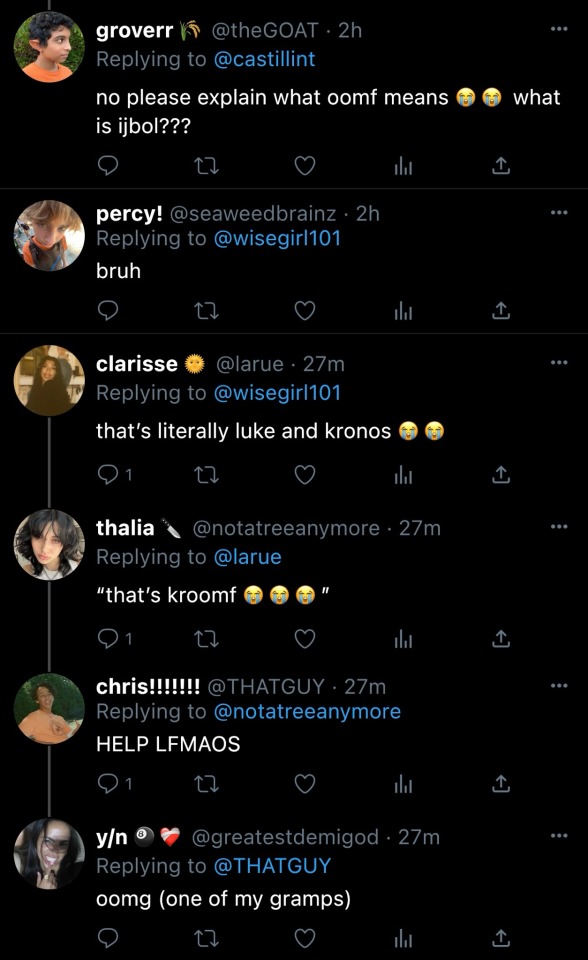
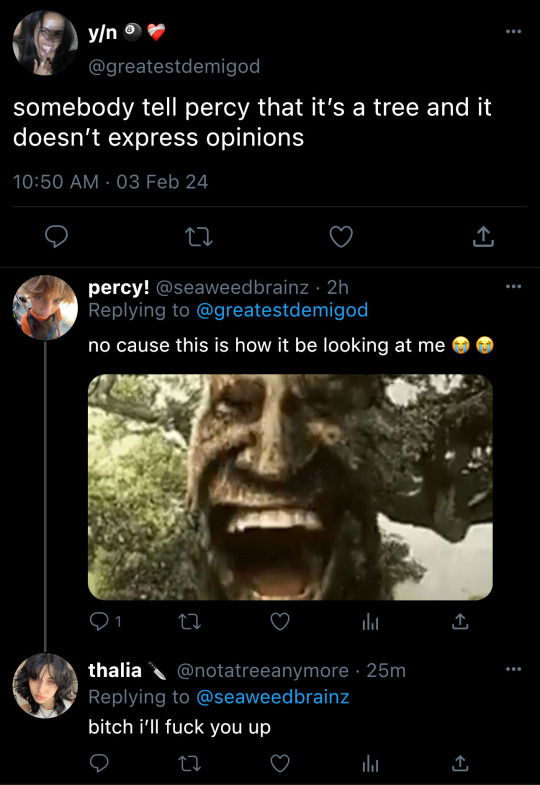

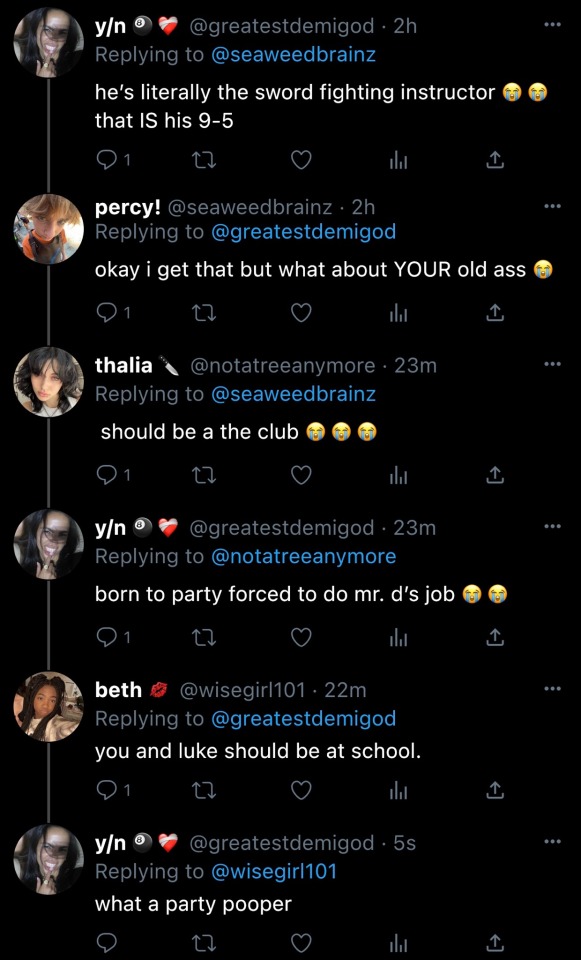




taglist: @mischiefmoons / @notplutos / @balletfilmss / @whiteoakoak / @pietrothemovie (lmk if you wanna be added <;3)
#i’m literally not joking about the watermark#next post is gonna have all of them with watermarks 😭😭#percy jackson#luke castellan x reader#luke castellan#luke castellan smut#luke castellan x you#pjo series#luke castellan fanfic#percy jackson spoilers#percy and grover#percy pjo#percy series#percy and annabeth#percy jackson tv series#pjo smau#pjo social media#chris pjo#clarisse pjo#thalia grace#annabeth chase#grover underwood x reader#grover underwood#clarisse la rue x reader#clarrise la rue#faye’s writing ⭑.ᐟ
1K notes
·
View notes
Text

Clarrise la Rue every Father’s Day:
#guess which is for Ares and which is for Hedge#pjo clarrise#coach hedge#ares pjo#in this house we don’t know cannon ares#he exists only for angst#gleeson hedge#clarisse my beloved#lately Clarrise represents my daddy issues#I’m not sure what to feel about this#pjo clarisse#clarisse pjo#clarisse la rue#clarrise pjo#pjo ares#ares greek mythology#clarrise la rue#ares percy jackson#ares cabin#ares god of war#pjo hoo toa#pjo funny#pjo fandom#pjo hcs#pjo headcanon#riordan universe#riordanverse#rick riordan#pjo verse#pjo universe
218 notes
·
View notes